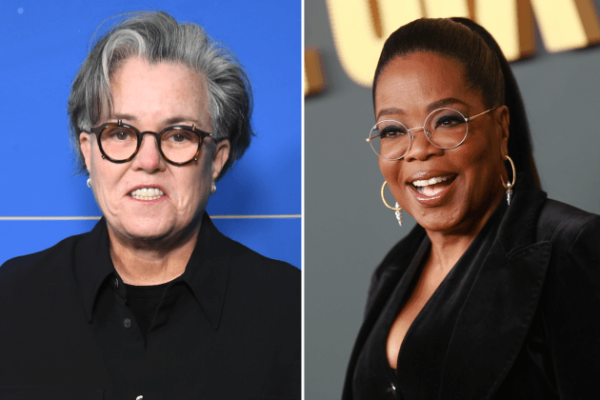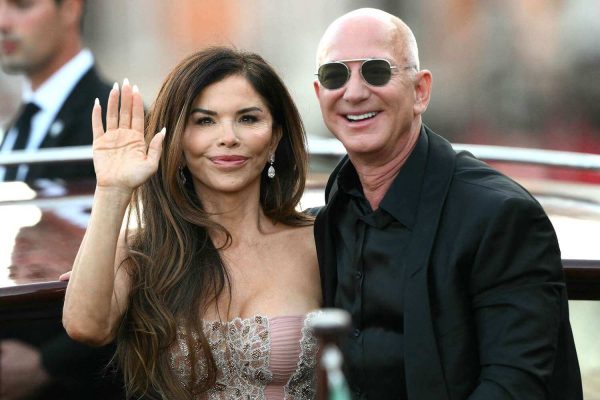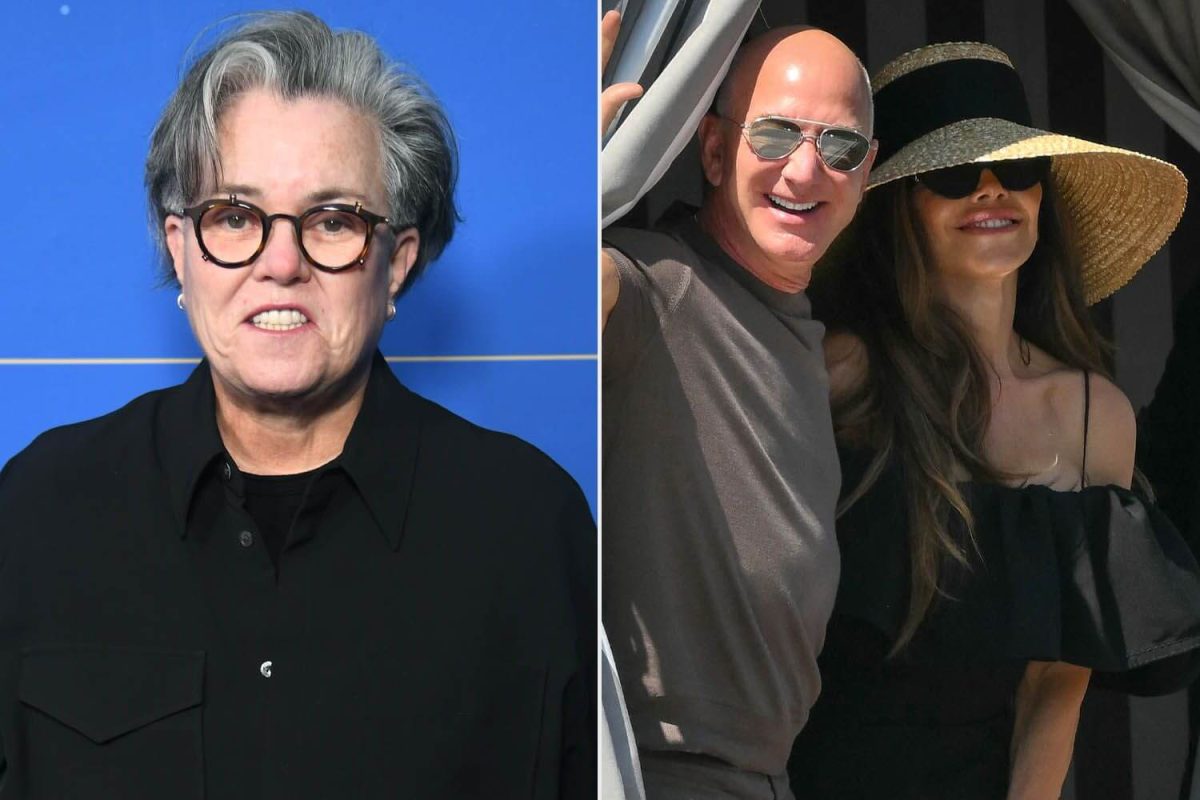world news
Rosie O’Donnell Slams the Excesses of Jeff Bezos’ Wedding: A Deeper Look into Wealth Disparities and Celebrity Critique
Introduction: The Public Outcry Over Excessive Wealth
In the realm of celebrity weddings, few events can stir as much public attention as the wedding of Amazon founder Jeff Bezos and his partner, Lauren Sanchez. Known for his immense fortune, Bezos’ wedding was a lavish affair that captivated headlines. However, not everyone viewed the extravagance of the event through rose-colored glasses. Rosie O’Donnell, the outspoken comedian, actress, and activist, recently slammed the “gross excess” of Bezos’ wedding, highlighting the stark contrast between the opulence of the ceremony and the struggles faced by many in society.
In this article, we will explore Rosie O’Donnell’s reaction to the wedding, the broader conversation about wealth inequality that her comments sparked, and the public debate about how the ultra-rich display their wealth. We will also examine how this public criticism sheds light on the growing divide between the wealthy elite and the everyday working class, and how this disparity plays out in the public’s view of extravagant celebrity and business mogul events.

The Lavish Wedding of Jeff Bezos: A Symbol of Excess
Jeff Bezos’ wedding to Lauren Sanchez wasn’t just another celebrity wedding—it was a spectacle of wealth and excess that showcased just how far the ultra-rich can go in their pursuit of opulence. Held on a private estate, surrounded by a luxurious guest list and some of the world’s most extravagant elements, the event immediately drew attention. The wedding was reportedly an affair fit for billionaires, with top-tier entertainment, designer gowns, and an elite guest list that included famous figures from the world of business, politics, and entertainment.
While weddings of this scale are not uncommon among the super-wealthy, Bezos’ wedding became a focal point for critics, especially when juxtaposed with the economic disparities that exist in society. For many, the wedding highlighted the growing gap between the rich and the poor, with Bezos himself being one of the richest people on the planet. The cost of the wedding alone was enough to spark debate about the ethics of wealth distribution. While Bezos’ fortune was built on the success of Amazon, a company that has faced criticism over its labor practices and impact on small businesses, his wedding became a symbol of the wealth inequality that many feel is unsustainable.
For those who struggle to make ends meet, the sight of such an extravagant event can feel like a slap in the face. It’s a reminder of the systemic issues that persist in society, where billionaires flaunt their wealth while many workers are barely able to survive on minimum wage jobs. This is the context in which Rosie O’Donnell’s criticism of the wedding was set, as she spoke out against what she deemed to be an immoral display of wealth.
Rosie O’Donnell’s Critique: “Gross Excess” and a Call for Change
Rosie O’Donnell has long been known for her blunt and unfiltered views, especially when it comes to social justice issues. Her comments about Jeff Bezos’ wedding were no exception, as she publicly denounced the “gross excess” displayed during the ceremony. For O’Donnell, the wedding symbolized a larger issue of how wealth is flaunted by the ultra-wealthy without regard for the suffering experienced by others.
In a social media post and subsequent interviews, O’Donnell expressed her frustration with how the elite class continues to amass wealth while the general public faces economic hardships. Her criticisms of Bezos’ wedding were not merely about the event itself, but about the broader implications of wealth disparity in a society where billionaires can spend millions on a single day while many Americans struggle to afford healthcare, education, and basic living expenses.
O’Donnell’s remarks struck a chord with many who feel that the concentration of wealth in the hands of a few individuals is not only immoral but also unsustainable. For her, Bezos’ wedding was an embodiment of a system that rewards a small group of people with unimaginable wealth, while the majority of the population is left behind. By calling out the “gross excess” of the wedding, O’Donnell was tapping into a larger conversation about the role of billionaires in society and the ethical implications of their wealth.

Wealth Inequality: The Stark Contrast Between the Super-Rich and the Working Class
The critique of Bezos’ wedding taps into a much larger and increasingly relevant conversation about wealth inequality. Over the past few decades, the gap between the richest individuals and the working class has grown dramatically. According to reports, the wealthiest 1% of Americans now own a greater share of the nation’s wealth than the bottom 90% combined. This staggering statistic paints a picture of a society in which a small group of people control a disproportionate amount of resources, while millions of others live paycheck to paycheck.
The ultra-rich, exemplified by individuals like Jeff Bezos, Elon Musk, and others, are often criticized for their lack of accountability when it comes to the societal implications of their wealth. While Bezos’ wedding was a private affair, the sheer spectacle of it made it impossible to ignore the disparity between those who live in luxury and those who struggle to meet basic needs. For many, the wedding represented a symptom of a much larger issue: the normalization of extreme wealth and the lack of empathy from the richest individuals in society.
The public outcry over Bezos’ wedding serves as a reflection of the growing resentment and frustration among working-class people who feel abandoned by the very system that rewards billionaires. O’Donnell’s comments, though pointed, are part of a larger chorus of voices calling for greater economic fairness, fair wages, and corporate responsibility. The divide between the super-rich and the working class is not just an economic issue but a moral one—one that touches on themes of justice, compassion, and the future sustainability of society.
Public Perception of the Ultra-Wealthy: The Pressure to Act Responsibly
The lavish wedding of Jeff Bezos has highlighted an important issue in the public’s perception of the ultra-wealthy: the expectation that they should act responsibly with their wealth. While many of the richest individuals in the world donate large sums to charitable causes, there remains a growing sense that these acts of philanthropy are not enough. Critics argue that the wealthiest individuals have an ethical obligation to do more to address the inequalities they benefit from.
In the case of Bezos, his fortune is not just the result of personal success but also the result of a business model that has been criticized for exploiting workers, damaging the environment, and contributing to the erosion of small businesses. While Bezos has made charitable donations, including a high-profile commitment to fund space exploration through his company Blue Origin, there is a widespread belief that this isn’t enough to justify the staggering wealth he and others in his position have amassed. The lavish wedding, in this context, can be seen as another example of the disconnect between the ultra-wealthy and the struggles of everyday people.
O’Donnell’s comments serve as a reminder that, for many, the display of excess wealth is not just distasteful—it’s a symptom of a larger, broken system. The criticism of Bezos’ wedding reflects the growing expectation that the rich should not only give back but should also recognize the role they play in perpetuating inequality. The conversation surrounding wealth inequality is no longer just about how the rich can donate their money—it’s about the systemic changes needed to create a fairer society for all.
Conclusion: Reassessing the Culture of Excess and Finding Solutions
Rosie O’Donnell’s criticism of Jeff Bezos’ wedding has sparked an important conversation about the role of wealth in society and the ethical responsibility of the ultra-rich. The “gross excess” of the wedding, as O’Donnell described it, is not just an isolated moment but a reflection of a larger issue that affects millions of people worldwide. The growing divide between the rich and the poor is not just an economic concern—it is a moral one.
As the conversation around wealth inequality intensifies, it is clear that the public is calling for change. O’Donnell’s comments are part of a larger movement that demands greater accountability from the wealthiest individuals, corporations, and governments. The growing resentment over extreme wealth is not just about the display of luxury—it’s about the systemic issues that allow such wealth to accumulate at the expense of others.
For O’Donnell, the critique of Bezos’ wedding is a call to action. It’s a reminder that the ultra-wealthy have a responsibility to use their power and influence to create positive change, not just maintain their status quo. As we continue to grapple with these issues, it is crucial to keep the conversation going—because, ultimately, the future of society depends on how we address wealth inequality and the moral obligations that come with extreme wealth.
From cdcustomtees

